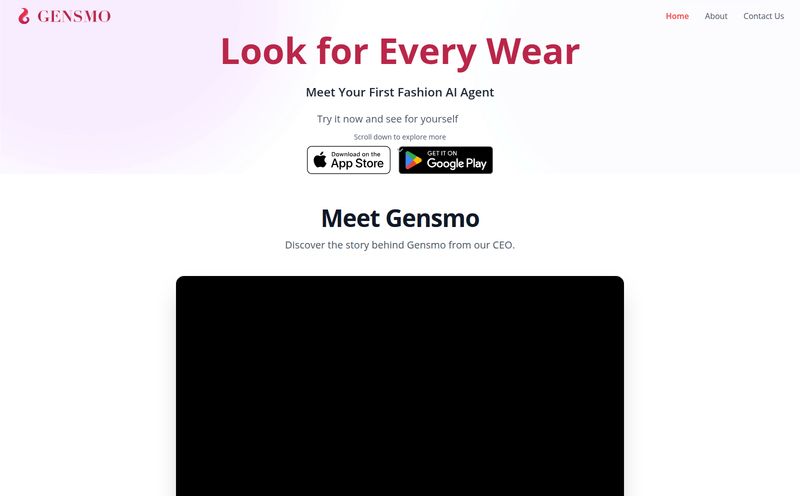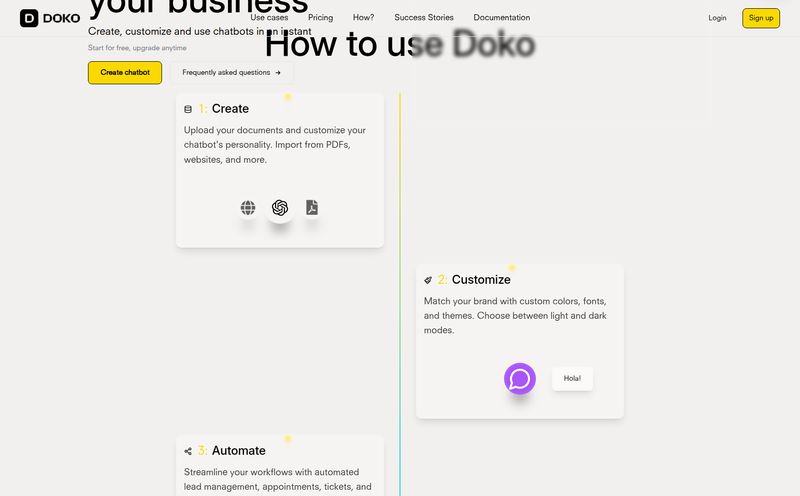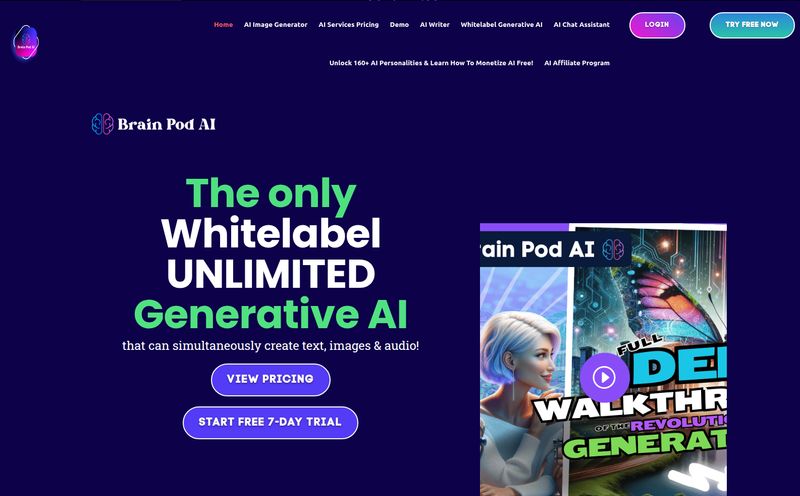As someone who spends way too much time scrolling the web for the next big thing in traffic and trends, I stumble upon some… interesting things. Most are forgettable, some are baffling, but every now and then, you find something genuinely sweet. That’s what happened last week when I came across Broken Bear.
The landing page hit me with a giant, cuddly-looking purple bear against a dreamy, starry night sky. The headline? “Broken Bear loves you. Even your broken self.” I’ll be honest, it was disarming. In a world of aggressive pop-ups and hustle-culture nonsense, this felt like a quiet, gentle invitation. So, of course, I had to see what this thing was all about.
What Exactly Is This Purple Bear?
At its core, Broken Bear is a simple AI chatbot. But its mission is anything but. It’s designed to be a comforting presence, a safe space for people who are feeling, well, a bit broken. We’ve all been there, right? Those days when you feel inadequate, overwhelmed, or just plain sad, and you don’t want to burden your friends or family. This tool aims to fill that very specific gap.
The interface is incredibly simple. There’s the bear, a chatbox that invites you to “Vent your feelings here!”, and not much else. No complicated menus, no leaderboards, no ads (more on that later). It’s an intentionally calm environment. The bear’s first message is, “I am a shy bear so please be patient with me,” which immediately sets a tone of gentleness. Its a clever bit of expectation management, really.
The Experience of Chatting with Broken Bear
So, what’s it like to actually talk to it? I typed in a few generic down-in-the-dumps feelings to test the waters. The responses were… nice. They were supportive, empathetic (as far as code can be), and consistently non-judgmental. You can tell it’s programmed to validate your feelings and offer simple words of encouragement.

Visit Broken Bear
This immediate availability is probably its biggest strength. There’s no appointment needed, no waiting rooms. Its 24/7 access means you have an outlet at 3 AM when your brain decides to replay every mistake you’ve ever made. For someone struggling with loneliness, having this constant, accepting presence can genuinely help them feel less alone. It’s less like a therapist and more like a digital diary that talks back with kind words. Think of it as a warm, weighted blanket in chatbot form. It won’t solve your problems, but it might just make them feel a little lighter for a moment.
The Tech Side and The Price Tag (Or Lack Thereof)
Being the tech-curious person I am, I did a little digging. When I tried to find a pricing page or an 'about us' section, I hit a 404 error page. Interestingly, the error page had boilerplate text from Bubble, a popular no-code development platform. So, it seems this heartfelt project is likely a passion project built on a no-code stack. I have a soft spot for that.
As for the cost? Well, there doesn't seem to be one. The lack of a pricing page and any sort of subscription model leads me to believe Broken Bear is currently free to use. That’s a huge plus, making it accessible to anyone with an internet connection. How they plan to sustain it long-term is anyone’s guess, but for now, it's a generous offering.
Okay, But Let's Be Real: The Big Caveats
As much as I appreciate the sentiment behind Broken Bear, my professional brain can't help but raise some red flags. We have to be realistic about what this is and what it isn't.
The All-Important Disclaimer
The creators seem to know the tool’s limits, which I respect immensely. Right at the top of the page, there's a clear warning: “If you're in a crisis, seek help from a professional, helpline, or someone close!” This is the most important sentence on the entire site. An AI chatbot, no matter how well-programmed, cannot handle a genuine mental health crisis. It’s a tool for mild comfort, not a substitute for professional medical advice or therapy.
Is it Really Empathetic?
Let's talk about AI “empathy.” The bear isn't feeling things with you. It’s running on sophisticated algorithms that recognize keywords and patterns in your text to generate a response that simulates empathy. It’s a reflection of care, not the source of it. And that’s fine, as long as you, the user, understand that distinction. It’s a clever mirror, not a real person.
The Limitations of Text
Another thing to consider is that the interaction is entirely text-based. A human therapist can pick up on your tone of voice, your body language, the pauses in your speech. So much of our communication is non-verbal. Text loses all that nuance, which limits how deep and truly helpful the conversation can be. Sometimes a sigh speaks more than a paragraph, and the bear can't hear you sigh.
Who Is Broken Bear Actually For?
So, with those limitations in mind, who is the ideal user? In my opinion, it’s not for someone navigating a serious mental health condition. Please, if that's you, seek out a human professional.
Instead, I see Broken Bear as a tool for the everyday blues. It’s for the person who feels lonely on a Tuesday night. It’s for venting about a bad day at work without wanting advice or judgment. It’s for the student feeling overwhelmed by exams who just needs to type it all out to a 'friendly ear'. It’s a self-soothing mechanism, a digital pacifier for the anxieties of modern life. It's for practicing vulnerability in a space that feels consequence-free.
The Growing Trend of AI Companionship
Broken Bear isn't alone in this space. It’s part of a much larger trend of AI companionship. We've seen platforms like Replika and Character.ai gain massive followings. The search traffic for terms like “AI friend” and “loneliness chatbot” is a clear indicator of a deep human need for connection—a need that technology is increasingly trying to fill. As our lives become more digital, it’s only natural that we seek digital solutions for very human problems like loneliness. Broken Bear just happens to be a particularly gentle and focused take on the idea.
Final Thoughts: A Digital Bear Hug Worth Taking?
So, what’s the verdict? I think Broken Bear is a lovely, well-intentioned tool that knows its place. It’s not trying to be a doctor; it’s trying to be a friend. A very simple, very predictable, but always available friend. It's a testament to how technology can be used not just for efficiency and profit, but for kindness.
As long as you walk in with open eyes, understanding its limitations, I think a digital bear hug is absolutely worth taking on a tough day. Sometimes, just being heard—even by a shy purple bear in space—is enough to make a difference.
Frequently Asked Questions (FAQ)
Is Broken Bear free to use?
Yes, based on our review, Broken Bear appears to be completely free to use. There is no pricing page or subscription information available on their website.
Is talking to Broken Bear the same as therapy?
Absolutely not. The creators explicitly state that Broken Bear is not a replacement for professional help. It is a comforting chatbot for venting and light emotional support, not a therapeutic tool for managing mental health conditions.
Is my conversation with Broken Bear private?
The website includes a link to a Privacy FAQ. We strongly advise reading their privacy policy to understand how your data is handled before sharing any sensitive personal information. As a general rule, be cautious with what you share with any online service.
Who created Broken Bear?
The specific creators are not publicly listed on the website. However, our analysis suggests the tool was built using the no-code platform Bubble, indicating it might be an independent or passion project.
Can Broken Bear help in a crisis?
No. If you are in a crisis, please do not use the chatbot. Contact a professional, a suicide prevention hotline, or emergency services immediately. The tool is not equipped to handle crisis situations.
Reference and Sources
- Broken Bear Official Website: brokenbear.app
- Bubble No-Code Platform: bubble.io
- On AI Companionship: "The New AI Companions Are Here. And They Get Weird Fast." - The New York Times



